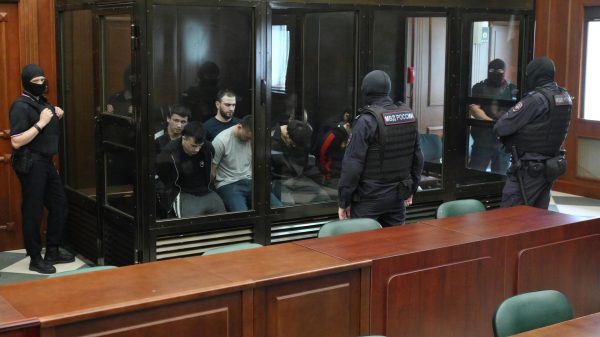 Speaking at Davos, Hunt acknowledged that voters were “unhappy” with high taxes. Photo: FABRICE COFFRINI/AFP via Getty Images
Speaking at Davos, Hunt acknowledged that voters were “unhappy” with high taxes. Photo: FABRICE COFFRINI/AFP via Getty Images
Jeremy Hunt is considering further cuts to the department's tax cut funding as he prepares to unveil an election budget that will draw new lines of battle against Labour.
The Telegraph understands the chancellor is willing to make smaller changes. will increase departmental spending budgets until the end of the decade if a worsening economy limits his ability to cut taxes.
It comes after official data showed a shocking fall in retail sales in December, leaving the British economy on the brink of recession , in a new blow for Prime Minister Rishi Sunak.
Under current plans, day-to-day government spending limits will rise by 0.9% in real terms until 2028-29.
< p>«We might give it up if it gives us more room to cut taxes,» one Whitehall source said.
Mr Hunt outlined his determination to cut taxes at the World Economic Forum in Davos. Switzerland, on Thursday, insisted that the «way of travel» is tax cuts and «pro-growth policies» to boost Britain's competitiveness.
Mr Hunt has already hinted at cutting personal taxes to ease the burden on households and businesses in the Budget on March 6.
The Chancellor also admitted voters were «unhappy» with years of tax rises as sources suggested he was planning a «big retail proposal».
The Prime Minister and Mr. Mr Hunt wants to drive a clear political wedge between the Conservative and Labor parties, which has also hinted at tax cuts for working families, including high earners.
Sources described renewed spending cuts as an «option» but would depend on official economic forecasts from the government's tax and spending watchdog.
One source said detailed plans would only be drawn up if the Office for Budget Responsibility (OBR) verdict on the economy did not provide enough scope for tax cuts.
OBR first decision . A verdict on the economic outlook is expected to be sent to Mr Hunt next week.
Mr Hunt has previously announced plans to boost productivity in the public sector, which has collapsed during the pandemic. In October he said: “We need a more productive state, not a bigger state.”
In a speech last summer, he also stressed that the Tories would “make sure our private sector is not strangled by an ever-expanding state.”
Government spending rose from 39.6. Pre-pandemic GDP will be around 44.8% of GDP this year, according to the OBR. It is still expected to be 42.7% of GDP by the end of the decade after peaking at 53.1% of GDP.
Speaking to reporters on Thursday, Mr Hunt welcomed the end of the era of low inflation, suggesting that lower borrowing costs could help finance a series of election giveaways.
However, he also hinted that the Tories were prepared to make «tough decisions» to improve the country's competitiveness, including further staff cuts.
«The priority for this government is to make the tough decisions that mean we grow faster,» Mr Hunt told reporters in Davos.
Government departments are already facing £19.1 billion in public spending cuts sterling after the election, leaving some departments facing deep cuts.
While this means overall budgets must increase, ring-fenced areas such as the NHS, where spending is projected to rise by 3.6% in real terms before the end of the decade, will mean spending cuts in other departments.
In November the OBR reported that public services with vulnerable budgets, such as prisons, courts and local authorities, faced a 2.3% cut in spending in 2025-26, which some economists had already called implausible.< /p>
Inflation was 4%. , already almost a percentage point lower than the OBR predicted just two months ago.
Slower price growth will reduce the government's huge debt interest bill as borrowing costs fall. It would also limit benefit spending.
But a slowing economy could lead to lower tax revenues as incomes grow more slowly and more people become unemployed.
Retail sales fell 3.2% in December, far more than the 0.5% decline economists had forecast.
Official data also show the economy shrank by 0. 1% between July and September and could fall again in the last three months of the year. This suggests the economy may be weaker than the OBR forecast in November.
This week Mr Hunt renewed his attack on Labour's £28 billion-a-year green investment plan , warning that she remains party to tax hikes.
A Treasury spokesman said: “We do not comment on budget speculation.”
























































Свежие комментарии